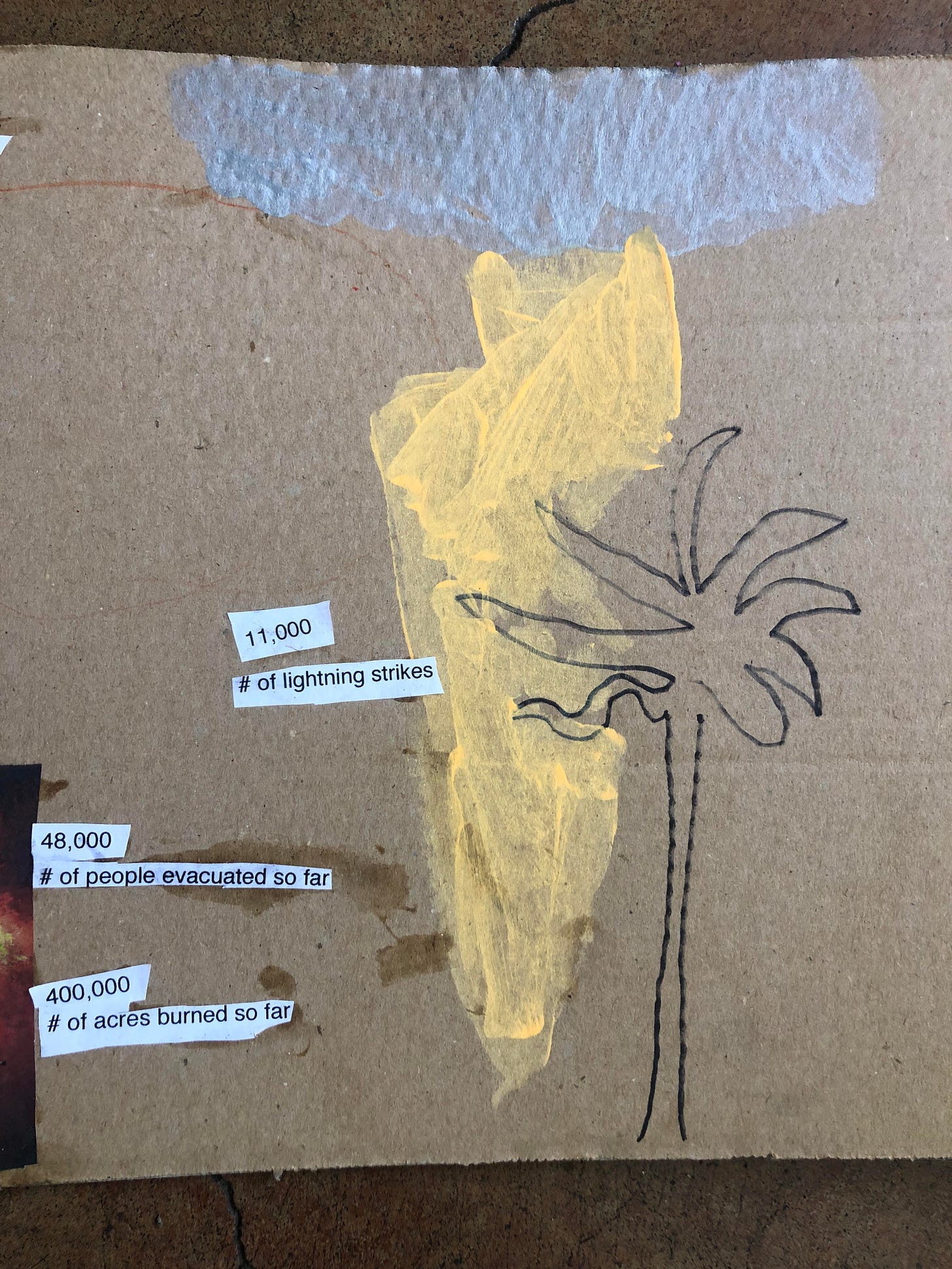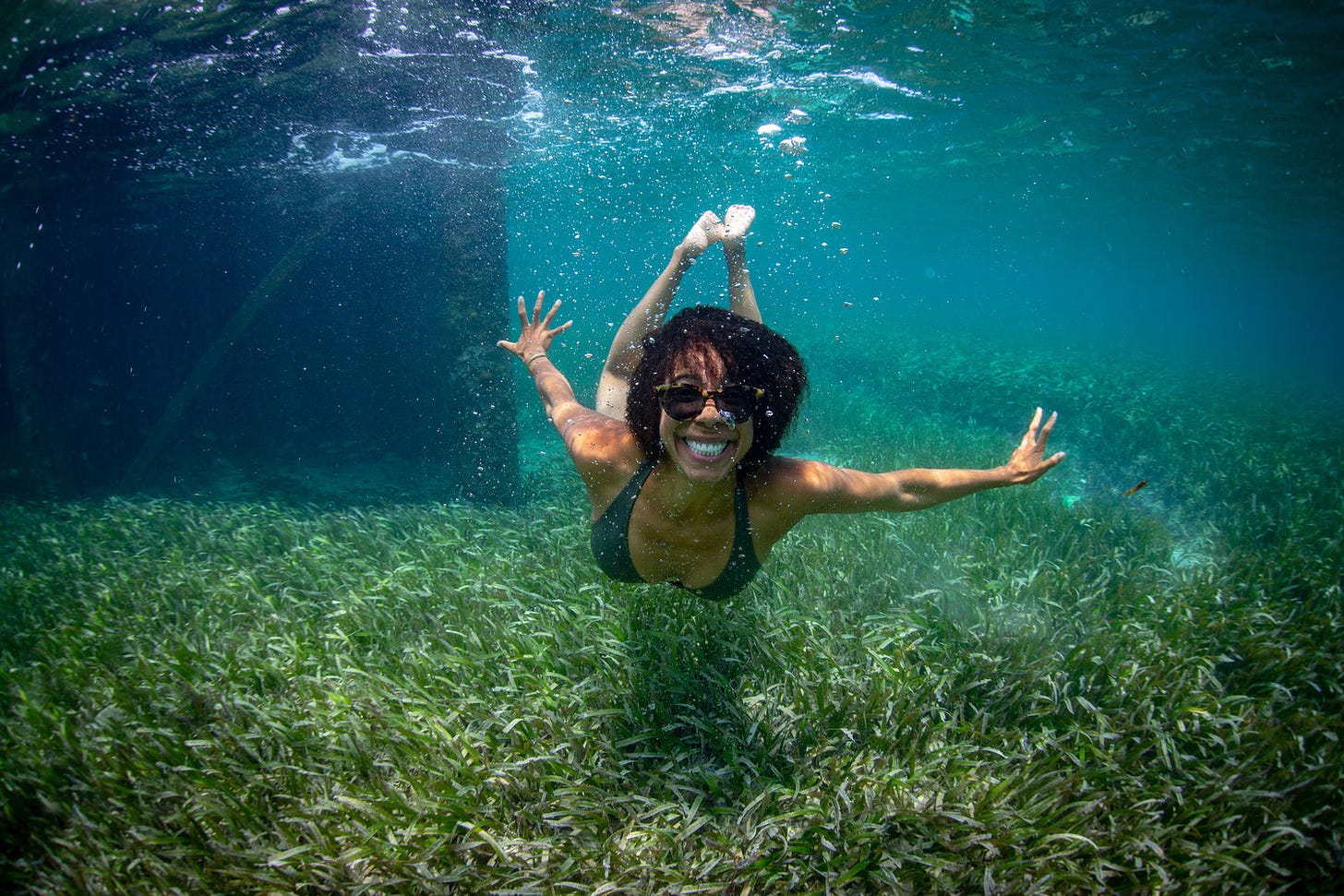'No right to give up on this magnificent planet'
5 questions for climate activist & writer Ayana Elizabeth Johnson
When the wildfires started, my 6-year-old and I realized we had a lot of questions. How hot was the lightning? How do forests recover? What does AQI stand for? But my biggest question really is: why have I been so slow to prioritize and focus on climate change? As embarrassed as I am admit that, I know I’m not alone, which I why I’m coming clean here.
Thank goodness I have brilliant, intersectional thinkers like Ayana Elizabeth Johnson to set me straight, and then open my mind and heart to a whole new way of thinking about this planet’s capacity for recovery and my role in it. In case you’re slow on the uptake like me, or just haven’t heard of this brilliant body of work yet, I bring you, Ayana…

Ayana launched a kids ocean camp in Barbuda in 2013.
Courtney Martin: You are a marine biologist by training, but now do a huge range of advocacy, writing, organizing etc. I like to imagine you as a little girl, growing up in Brooklyn, and thinking about how to foster the same curiosity and agency in my 6-year-old. When did you discover your love for the ocean? And how did you cultivate such a clear, confident voice?
Ayana Elizabeth Johnson: I grew up working class, and family vacations were very rare, but when I was 5, my parents took me to Key West, Florida. They taught me to swim, took me for a ride on a glass-bottom boat, and I got to visit an aquarium. I was fascinated by the ocean, this magical underwater world teeming with life, and I just wanted to know all about it. I saw a coral reef, held a sea urchin in the palm of my hand, started shell collection, and that was it. I was hooked. I think that humans have an innate love for nature and its wonders – biophilia as renowned naturalist E.O. Wilson calls it. So perhaps it’s more about indulging that curiosity than cultivating it.
As for the clarity and confidence of my voice, I think that comes from understanding the urgency of this moment, wanting to draw people into climate work because we simply must build the biggest team, and from having given up on being cool around age 12, so there is nothing left to do but tell the truth. Also, I am a firm believer in the saying that if at first you don't succeed, try, try again. I think trial and error is an underrated approach to life – the “trying” part being paramount.
The wildfires are top of mind for me. It feels like another opportunity for us to understand how climate change, structural racism, and economic precarity are intertwined. Why have we been so slow to see these intersections in America and do you think that’s finally changing?

My kid made some art about her wildfire questions.
Yes, the wildfires. And also the hurricanes. This is the new normal. The climate has changed. And it is oh so clear who gets hit first and worst by these disasters – it’s people without the resources to get out of harms way, without the resources to rebuild their lives, without the political power to ensure resources for their communities. It’s communities of color and low income communities. It’s heartbreaking.
I’m writing this as fires rage across the entire state of California and the Governor has issued an unprecedented warning, that every single Californian should have a go bag packed, and to park their cars nose out in the driveways for quick getaways. And the National Hurricane Center is calling the storm surge in the Gulf coast “unsurvivable,” a word they have perhaps never used before.
And my heart is so heavy knowing that the climate-induced drought has fueled the wildfires, and the climate-induced warm ocean water has fueled the hurricanes. We have been slow to see these connections because the fossil fuel industry has spent revolting heaps of money to make sure we don’t see them. Instead of pivoting to become energy companies and truly investing in renewables, they have doubled down on being fossil fuel companies, funded massive misinformation and climate science denial campaigns, and made us feel like it's all on us as individuals – they invented the concept of an individual “carbon footprint” to make us think small and feel guilty! But, yes, I do think this is finally changing. More and more people are seeing through this. Thank goodness.
Tell us about All We Can Save, your new anthology. Why did you decide to put it together and what do you hope people get out of it?
I am so in love with this collection of wisdom from women climate leaders. It’s 41 essays, plus poems and original illustrations. It has truly been an honor to curate and edit All We Can Save: Truth, Courage, and Solutions for the Climate Crisis with Dr. Katharine Wilkinson. These are voices we need to listen to. There are so many climate solutions at our fingertips.
We consider each essay a door into how to contribute to solutions, and our hope is that everyone who reads it will find new ways to follow and lead and participate, and find the motivation to bring their friends and family and communities into the fold. For those already deeply engaged in climate work, we hope they will find this book to be a balm and bolster them to keep charging ahead. We hope it will help people match their particular skills to contribute to the work that needs doing. We hope it will be for others as it was for us: informative, inspiring, and captivating. I know this will sound absurdly biased, but it’s extremely good. (This is accurate! Preorder it now. -CM)
In it, you write, “There is a renaissance blooming in the climate movement.” Can you tell us about it? (Lord knows we need something to feel hopeful about.)
We are in the midst of a feminist climate renaissance. Feminine leadership, which has always been blooming, is starting to be seen and supported and that needs to be amplified and accelerated. To that end, Katharine and I have co-founded a nonprofit, The All We Can Save Project, to carry on the education and engagement, community building, and direct financial support of women climate leaders. We deliberately choose “renaissance” over “revolution” as we feel this is a time for rebirth and not destruction, a time for healing – of nature, communities, and our relationships with both. So much energy and momentum has built around this book this collection of leaders and their wisdom, that we felt it to be our duty to create a vessel to carry that forward. For those interested in supporting the work growing out of this book, please reach out via our website: allwecansave.earth.
In my fantasy life, you are the president of the United States starting tomorrow. What is your first act in office? Who do you surround yourself with?
Ha! Well, I would immediately (1) undo all of the 100 rollbacks of environmental rules the Trump Administration has pushed through, (2) push for comprehensive climate policy that would meet the rapid reduction in greenhouse gas emissions that science and justice require, across electricity generation, transportation, buildings, agriculture, and manufacturing, and (3) protect and restore ecosystems as they absorb tons of CO2 and buffer us from climate disasters.
And I would certainly surround myself with all the contributors to All We Can Save, many of whom are policy phenoms, and also scientists, community organizers, designers, and poets. We need a diversity of perspectives, expertise, generations, races, and geographies at the table if we are to come up with the solutions and approaches we need. Diversity just works better. And one of the core motivations for the book was that Katharine and I were sick of hearing the same few, white, male voices put forward as thought leaders on climate when we know heaps of others who should be given megaphones.
And lord knows we need poetry to feed our souls right now and keep us going, and to remind us that we are not alone, and that our efforts are worth it, and that we simply have no right to give up on this magnificent planet.

Swimming in Jamaica’s seagrass. Credit: Jeremy McKane



